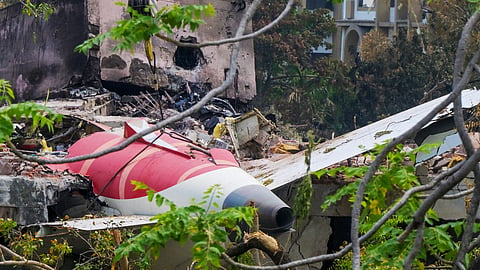

A minute. That’s all it takes. One minute. Much more than just 60 fleeting seconds. It’s almost unimaginable, isn’t it? How something so brief can change everything. One moment, you’re fastening your seat belt, and the next, you’re re-evaluating your entire existence on a crashing aircraft. It’s as if time itself has a sense of irony—dark, twisted, and utterly mind-numbing.
The recent crash of Air India Flight AI 171 over Ahmedabad was one such moment. A routine flight turned catastrophic—not over hours or even minutes, but in a mere 32 seconds. In under a minute, nearly 300 lives were changed or lost. And with them, a ripple of grief swept through a nation that watched, helpless, as the news unfolded on TV screens and mobile phones.
In the unyielding march of time, a single minute often passes unnoticed. Yet, within that fleeting span, life can pivot, transforming from the mundane to the profound. This transient moment, so easily overlooked, underscores the fragile illusion of control we hold over our existence.
Take Newton, for instance. The man was sitting under an apple tree, minding his own business, when an apple fell on his head. And apparently just like that, gravity was discovered. One minute, he’s enjoying the shade; the next, he’s rewriting the laws of physics. Talk about a freak day.
Then there’s Archimedes, who was relaxing in his bath when he noticed the water level rise as he got in. Eureka! he shouted. In that moment, Archimedes had an epiphany that led to the principle of buoyancy. All it took was a bath and a bit of water displacement.
And let’s not forget Patanjali, who didn’t need apples or baths. His moment of clarity came when he achieved mental stillness. In that stillness, he found the foundations of yogic wisdom. No fruit, no water, just a quiet mind. If only it were that simple.
In the Vedic tradition, the momentous minutes called ‘Muhurta’ is derived from two Sanskrit roots: ‘Muh’ meaning ‘moment’ or ‘immediate’ and ‘Rta’ meaning ‘order’ or ‘cosmic law’. ‘Muhurta’ is considered crucial for the success and prosperity of various activities, such as weddings, housewarmings, starting a new business, or embarking on significant journeys. A ‘muhurta’ is a momentous moment that carries the cumulative effect of millions of space-time events, expressing the cosmic order.
Tragedies like the crash of AI 171 confront us with minute’s deep intensity. But they also deepen our reverence for life and for the fleeting nature of awareness. The same fraction of time that brings upheaval can also bring understanding. For perception—that quiet inner compass—often shifts not over years, but in sudden flashes. They’re reminders that clarity often comes unannounced—in a second’s whisper, a sigh, a moment of silence.
We often believe wisdom is earned only after a long struggle. But sometimes, all it takes is a shift in how we see the world. The world remains the same, but the eyes that see it are transformed. In this light, time becomes a curious thing. A minute may represent a lifetime. And a lifetime may pass without a single minute’s insight.
If we must take anything from such heart-breaking moments, let it be this: Cherish the one minute you have. Because in them lies the power to connect, to reflect, and perhaps, if grace allows, to awaken.